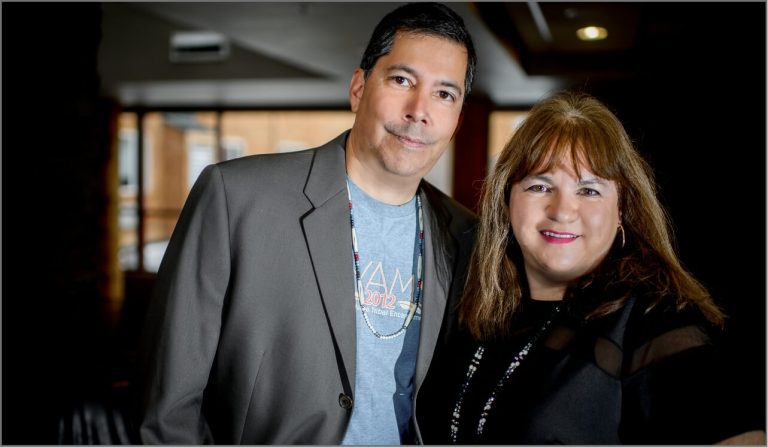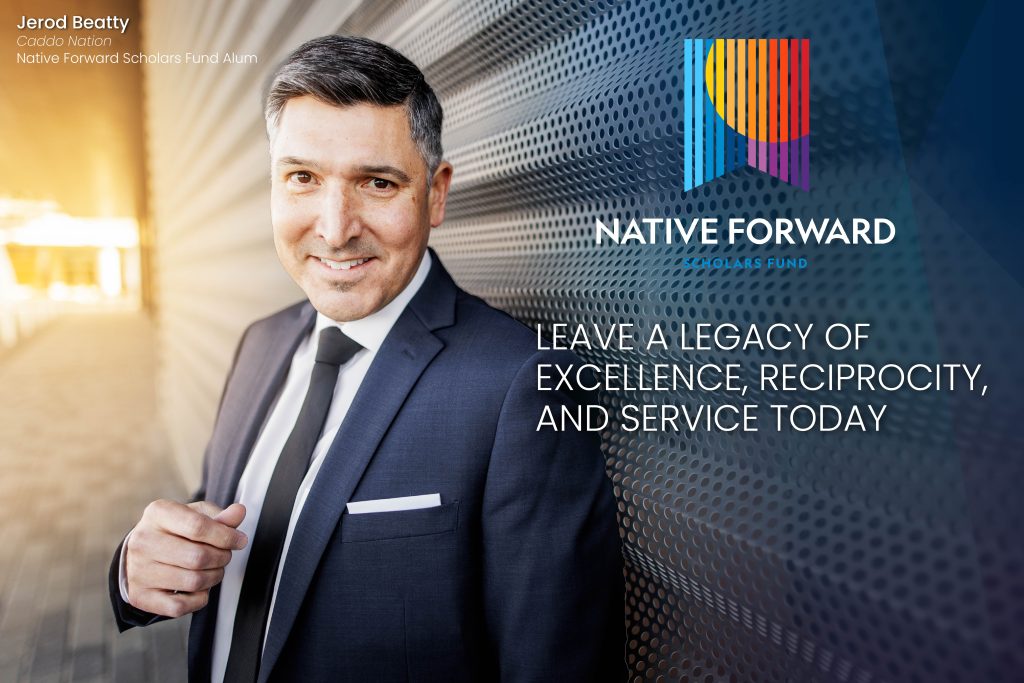Growing up in the Inland Northwest, Native Forward Alumnus Jeff Ferguson (Spokane Tribe) experienced the racism, bullying, and historical trauma that often limits Indigenous people from living a quality life and achieving higher education.
Despite these challenges, Ferguson realized his higher education goals. But to get there, he first had to reclaim his narrative from childhood.
Reclaiming truths has been Ferguson’s life journey. It is part of the major reason he is now the news director for Inland Northwest Native News and a freelance photojournalist, as well as why he graduated this past spring with a Master of Business Administration in American Indian Entrepreneurship from Gonzaga University.
Prior to Gonzaga, he enrolled at Spokane Community College for his associate degree in photography and thereafter achieved a bachelor’s degree in communications from Whitworth College. In addition to working odd hours to make ends meet, as a single father, he secured scholarships from his Spokane Tribe and Native Forward, which helped reduce his financial burden and empowered him to reach his goal of getting his degrees debt-free.
“We have horrific histories as Indigenous people, but we are each our own beacon of resiliency, which comes from the strong bloodlines of our ancestors,” Ferguson said. “American Indian Graduate Center helped me fund my graduate program at Gonzaga.”
Ferguson makes it seem easy, right? It depends on how one views his story. There are many episodes in Ferguson’s life that would keep an average person in the trenches of his or her misery. Instead of blaming his past though, Ferguson first had to investigate the cause of some of his triggers directly influencing his behavior. This required him to reconcile his past of being a high school dropout, as well as the resentment he held toward his mother and late father for his cultural identity issues of being Salish, English, Spanish and Italian.
Forgiveness, Ferguson says, was key to some of his life changes. He first had to forgive his mother for her mistakes in raising him; he came to understand her shortcomings as a parent were likely the result of her having lived through the termination era and boarding school. As a child, he had to step up and support her with finances. This responsibility caused Ferguson to grow up faster than his peers. This also meant he did not get the nurturing he wanted and needed from his mom.
“She did not know how to get into college, and I resented her for that,” Ferguson said, adding he was also targeted by high school.
He also had to forgive the bullies in high school, who taunted him for his proud and resilient identity as an enrolled member of the Spokane Tribe. The bullying often made Ferguson ashamed of his Indigenous identity, which only heightened the pervasive racism between his people and Spokane’s majority white population.
“Bullying is something that is hard to describe – it happens,” Ferguson said. “We, as Indian people, are bullied for anything that we do.”
Because of these experiences and other factors, Ferguson moved away from Spokane and the Inland Northwest, until his life changed for the better in 2009 at 37 years old.
This is when he learned his mother, who had become ill and nearly died from laying on the floor for three days with no emergency care, had advised him to enroll back in college for a chance at better opportunities and quality of life. At this point in life, the U.S. economy had crashed.
“It was bad. I needed to do something else and that was a good time to go to school,” Ferguson said.
In school at Spokane Community College, Ferguson began his healing process. By this time, he created a documentary exploring the sexual abuse scandal of his community. His late father’s suicide in 1977 was directly related to what he found – his father was sexually abused by a local priest at a boarding school. Not just his father, but several dozen Native children. Discovering this helped Ferguson understand some of his own traumas throughout the years.
“It allowed me closure but led me to the giant loop due to the work I do – historical documentarian videography,” Ferguson said.
His documentary eventually inspired him to enroll at Whitworth College and establish the Inland Northwest Native News, a news outlet dedicated to covering Indigenous issues of the Inland Northwest. Since creating his news network, Ferguson has covered some high-profiled stories in Indian Country like Standing Rock, Missing and Murdered Indigenous Women and Girls, and the use of Natives as mascots.
“Being able to give back to Indian Country and tell people’s stories, I did not think it would be important to tell stories,” Ferguson says. “A lot of them are traumatic but there’s lots of triumph for Indian people. The Native people here today are survivors from strong bloodlines.”
Now finished with his MBA, Ferguson sees limitless opportunities ahead. For instance, he’s becoming more known across Indian Country and is in demand for his creative skills. He’s secured gigs, for instance, with the National Indian Education Association and Eastern Washington University as a videographer. He also established a nonprofit organization tasked with empowering Native youth to nurture healthy lifestyles and families.
Ferguson’s most recent work as an artist reclaims the real history of the city of Spokane. Along with Native artist Smoker Marchand, Ferguson installed a metal fisherman piece called “A Place of Truths Plaza,” on the Spokane River. The river is a cultural resource and water system of the Spokane people. The art installation has allowed Ferguson to reclaim his presence in the community he pushed away as a teenager.
When it comes to offering advice to students like him, Ferguson advised never, ever give up. If your dreams are still manifesting in the mind, go for it.
“The difference is to keep going. I did not ace all my classes. However, I did not think it was beyond my reach. Anyone can do it, just as long as you endure. Set your goals,” he said.
Read more articles like Native Forward Alumnus Reclaims Narrative in the Fall 2020 edition of Native Forward Magazine.






